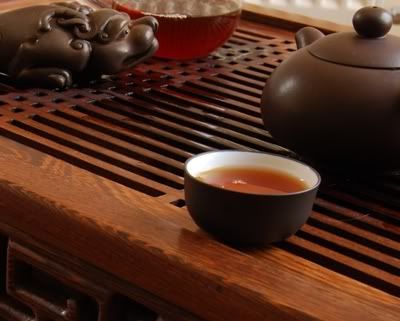Hold the front page, it's a Menghai special bing. This promises to be good. When Menghai claim "qiaomu" [arbor] and "laoshu" [old tree], you know you're in for a treat. Unsurprisingly, so do the vendors. The price of this 5-year-old cake is a fairly whopping $100 at Puerh Shop. Whether or not it's worth the money, I get ready for an enjoyable solo session.

The leaves (below) have some reassuring rusted orange colours. I see large fur-covered tips, and some sections of much larger leaves. The high proportion of stems is striking - this is filled with branches! Lots of "yellow leaves" abound, too. This is not necessarily a bad thing in either case, as such ingredients can add some fine complexity. Menghai really mix the kitchen sink into their teas. Maybe that's the secret of their success...

A gentle aroma of shicang [wet storehouse] radiates from the dry leaves, which is at odds with the "dry stored" description on the product web-page.
After brewing, further indication of wet-storage: an orange-red soup from a 5-year-old tea? Surely some shicang has been used for aging acceleration.
The scent in the wenxiangbei [aroma cup] is pure shicang, and so we have our answer. Of note is an enduring medicinal lengxiang [cool scent].

The brew itself (above) is very clean, delivering a buttery shicang flavour. It is high and sweet, with plenty of cedar woodiness. The feeling is calming, yet energising - always an excellent combination. There is plenty of calming chaqi, yet again I suspect this may be personal susceptibility coming into effect.
My dear wife passes through: "Is that a 90s tea? It looks aged! 2000 at the latest."
"It's 2003", I reply.
"Ah, shicang", she nods, sagely.
I look at the writing in my diary, where I had written just the same, and smile to myself.
Later infusions show some underlying hongcha malt. The wet leaves are wackiness incarnate (below), consisting of:
i) healthy green leaves
ii) very dark, crispy, black leaves - almost shupu
iii) red all-over-oxidised leaves
Menghai, you cheeky devils.

"I would not pay £50 for this", sayeth She. And indeed, nor would I. A really enjoyable tea, nonetheless.

The leaves (below) have some reassuring rusted orange colours. I see large fur-covered tips, and some sections of much larger leaves. The high proportion of stems is striking - this is filled with branches! Lots of "yellow leaves" abound, too. This is not necessarily a bad thing in either case, as such ingredients can add some fine complexity. Menghai really mix the kitchen sink into their teas. Maybe that's the secret of their success...

A gentle aroma of shicang [wet storehouse] radiates from the dry leaves, which is at odds with the "dry stored" description on the product web-page.
After brewing, further indication of wet-storage: an orange-red soup from a 5-year-old tea? Surely some shicang has been used for aging acceleration.
The scent in the wenxiangbei [aroma cup] is pure shicang, and so we have our answer. Of note is an enduring medicinal lengxiang [cool scent].

The brew itself (above) is very clean, delivering a buttery shicang flavour. It is high and sweet, with plenty of cedar woodiness. The feeling is calming, yet energising - always an excellent combination. There is plenty of calming chaqi, yet again I suspect this may be personal susceptibility coming into effect.
My dear wife passes through: "Is that a 90s tea? It looks aged! 2000 at the latest."
"It's 2003", I reply.
"Ah, shicang", she nods, sagely.
I look at the writing in my diary, where I had written just the same, and smile to myself.
Later infusions show some underlying hongcha malt. The wet leaves are wackiness incarnate (below), consisting of:
i) healthy green leaves
ii) very dark, crispy, black leaves - almost shupu
iii) red all-over-oxidised leaves
Menghai, you cheeky devils.

"I would not pay £50 for this", sayeth She. And indeed, nor would I. A really enjoyable tea, nonetheless.

Interesting.
ReplyDeleteThank you for the new term: lengxiang
I have been using the word menthol in my notes - which partially describes it...
Bless the wee bugs that produce whatever it is that we are tasting - but I don't like that much of it...
Lethargus
200 RMB .. tops ..I'm seeing prices drop in the Mainland. john
ReplyDeleteHow does it compare to the menghai special grade 2001 or the 2004 mulitcolored dayi?
ReplyDeleteIt's kind of fun sometimes to be had by Menghai, the 2001 for instance is probably a very successfull 'con', so sucessfull I almost 'crave'it some days when an even more alive sheng is just too athletic.
Menghai is more for couch potatoing on wet days.
Thanks I just saved 100$!
Dear Lethargus,
ReplyDeleteThough that would be a good way of using the term "lengxiang", I don't want to mislead you - what I was referring to was the second stage of the tea's aroma in the aroma cup, as it cools (as described in an older article, The Zen of Wenxiangbei).
That is, I usually mean "lengxiang" to refer to the aroma once all of the short-lived volatile compounds have radiated away, leaving the longer, "lower" components of the scent - what perfumeries term the "bass note" or "heart note".
Dear John,
Two hundred?! I am really rather looking forward to this year's China trip, if these prices are typical. :)
Dear Michel,
The 2001 is one of my old favourites, and is more enjoyable to my tastes. I haven't tried the 2004 Dayi I'm afraid, so can't comment there. :)
I love your phrase, "to be had by Menghai", that's so true. I'm going to quote you, be warned!
Toodlepip all,
Hobbes